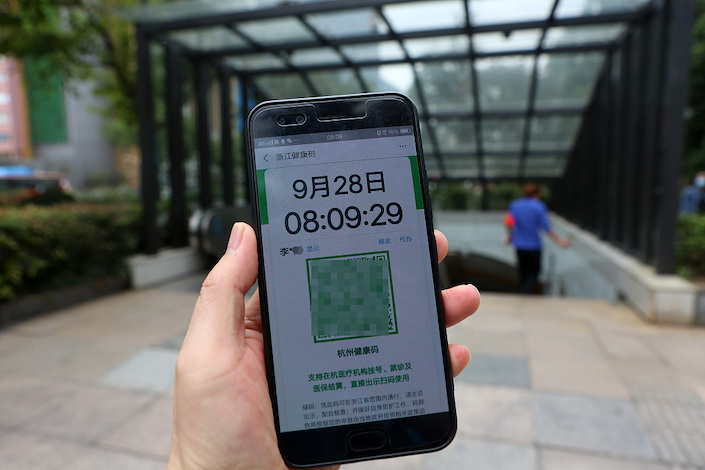
The news that clients of several village banks in Henan province in central China were given red health codes exposes a long-feared public threat. As important tools for Covid-19 prevention and control, the health codes collect residents’ private information, requiring their strict use in accordance with laws and regulations. The authorities in Henan gave red health codes to bank clients who had trouble withdrawing money to prevent their rights protest rather than to combat the virus. This act infringed on personal freedom, severely violated citizens’ rights and shook the foundation of pandemic prevention and control.
The truth is still in doubt days after the public outcry. Some homebuyers in Zhengzhou also had their codes turn red after they reported problems to authorities. The codes turned green after they attested that they were not clients of village banks. This indicates there was not just a single case of health-code abuse. The Zhengzhou Municipal Commission for Discipline Inspection and Supervision initiated an investigation and accountability process and will handle violations of the Administrative Measures of Henan Province on Health Codes for Covid-19 Prevention and Control in accordance with laws and regulations. Considering its baleful influence beyond Henan, the superior authorities should take charge of the investigation. All participants should be held responsible. Loopholes must be found, and technical and institutional deficiencies must be quickly remedied.
There had been sporadic leaks of epidemic-related information, but the cases in Henan sound the alarm over information collection amid the pandemic. Personal information compiled through health codes and other channels is at risk of leakage and is liable to be used for other purposes. To prevent improper use of personal data requires issuing clearer and stricter rules for protection of pandemic-related information and clarifying responsibilities of all parties. There also needs to be a withdrawal mechanism and a road map for destroying the information. Any attempt to perpetuate the use of health codes will only exacerbate public anxiety and violate public trust.
The incident is not simply a case of information leaking. Rather, it indicates that health codes have already been manipulated as a means of social control. Apart from those who arrived in Zhengzhou, other banking clients who had not yet set out for the city were also given red codes. It is a vicious, nationwide scandal. Over the past three years, the public has been sacrificing its rights in support of the national fight against the pandemic. It is a bitter disappointment that those sacrifices are now being exploited for unrelated purposes.
It is illegal to issue red health codes for reasons other than virus containment. Pursuant to the Personal Information Protection Law of the People’s Republic of China, the processing of personal information must comply with principles of legality, fairness, good faith, minimum necessity, openness and transparency. There must also be specific and reasonable purposes for processing the data. Using health codes as a tool to restrict clients’ movements is an infringement of citizens’ personal information. In performing their statutory duties, national authorities should process personal information according to the power and procedures in laws and administrative regulations and should not exceed the scope and limits of their statutory duties. If public officials go beyond that scope, they will be suspected of abuse of power, with no doubt.
Since the Covid-19 outbreak, the central government of China has put a high value on security management of disease-related information. The Joint Prevention and Control Mechanism of the State Council stressed that pandemic-based personal information must not be used for other purposes. It issued the Interim Measures for the Management and Service of Health codes for Covid-19 Prevention and Control. Local governments also issued management measures to prevent illegal use of data through health codes. In these cases, the actions of authorities in Henan violate the central government’s requirements.
Strict investigation should aim to punish direct participants and ascertain the underlying chain of responsibility to uncover the truth. In this case, code manipulation is traceable, and the investigation is not difficult considering the availability of electronic records. The real difficulty lies in whether authorities are willing to follow the entire chain. Concealment is the biggest danger in the accountability system. The 2021 Henan floods provided a bitter lesson, and Henan must not commit the same error again.
The abuse of health codes is an abuse of power. An incomplete investigation of the incident will abet bad practices for other authorities. As health codes are exclusively used for pandemic control, information collected for the system must be deleted once the pandemic needs end. Many regions value only the convenience of management and control through health codes but take no count of security, regulation and other issues that may follow, not to mention data destruction. Breaking laws and regulations to collect and use personal information surely will increase the risks of information leakage and illegal use. As a result, all Chinese will become victims of the unrestrained collection of personal data.
In the era of information technology and big data, platforms such as health codes play a significant role in governance. However, issuing red health codes to bank clients is a warning for us: Only if the power is held under rigorous control can the health codes be properly used. We should keep in mind that the greater the power is, the greater the harm that may be brought about by its abuse.
Get our weekly free Must-Read newsletter.







